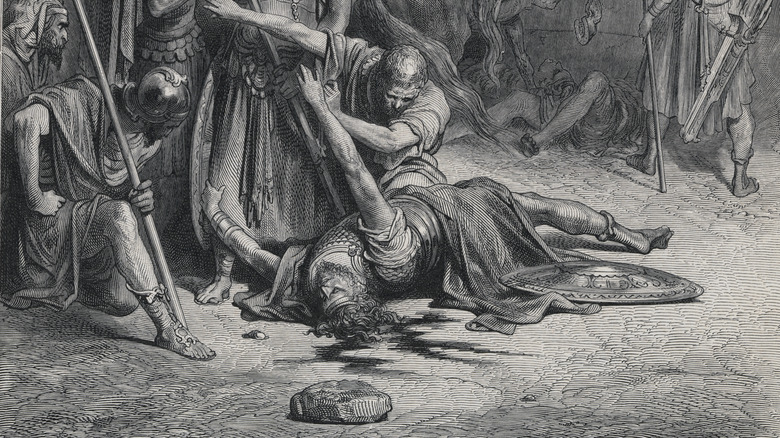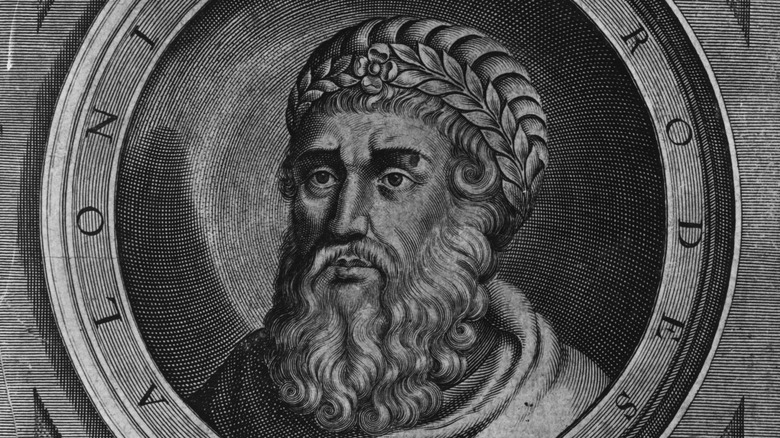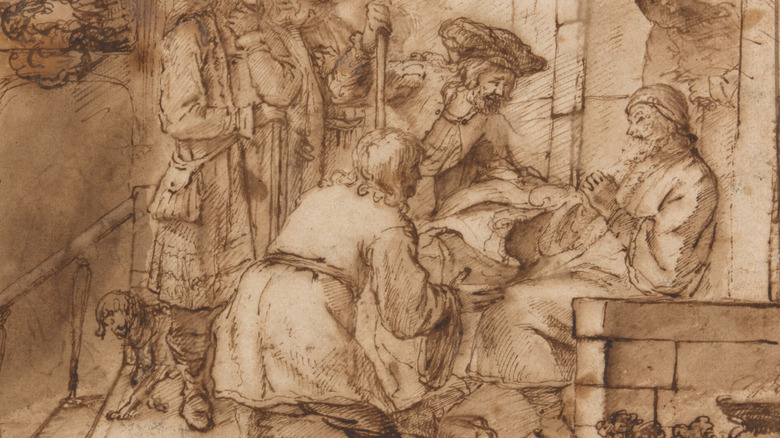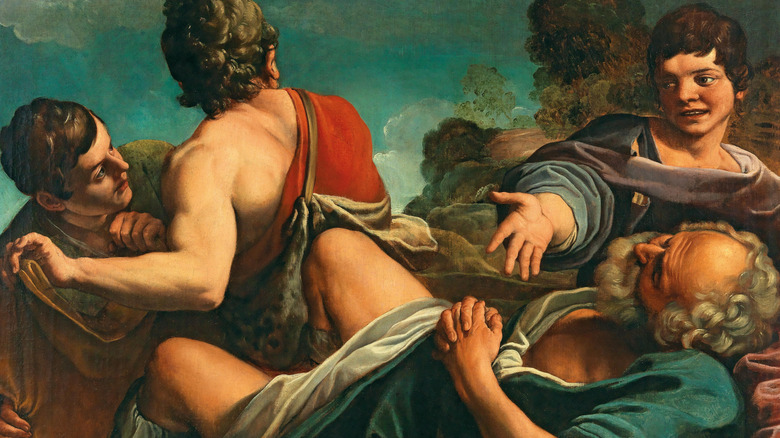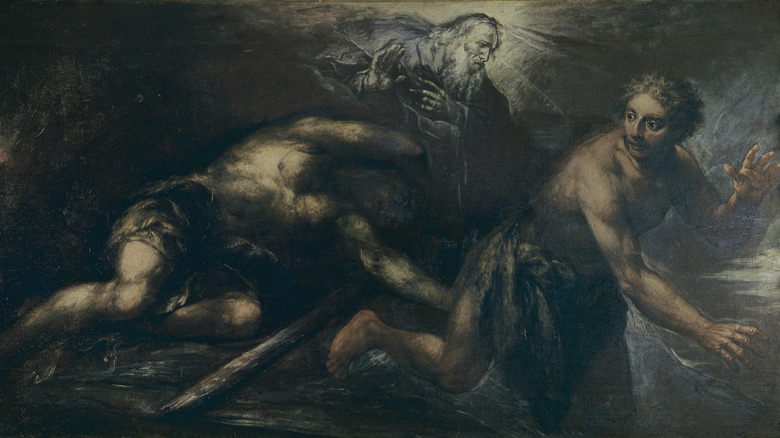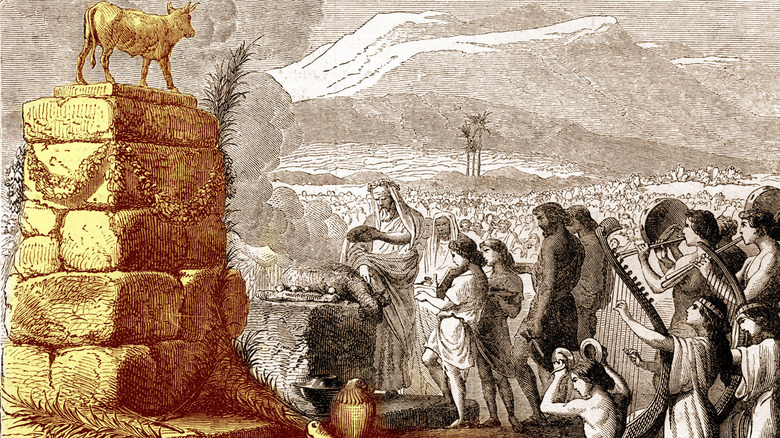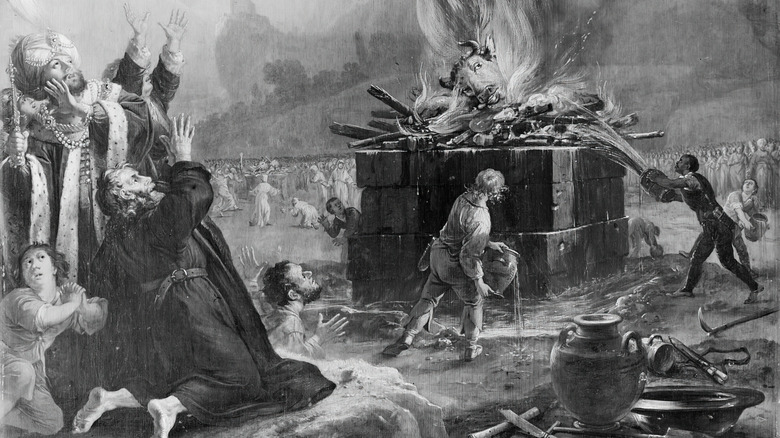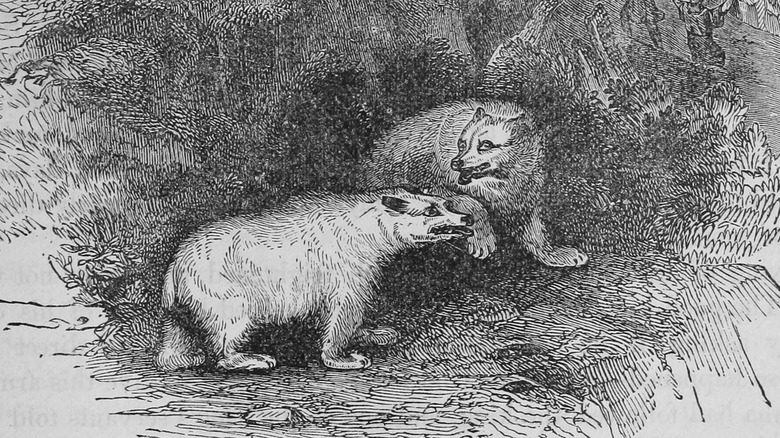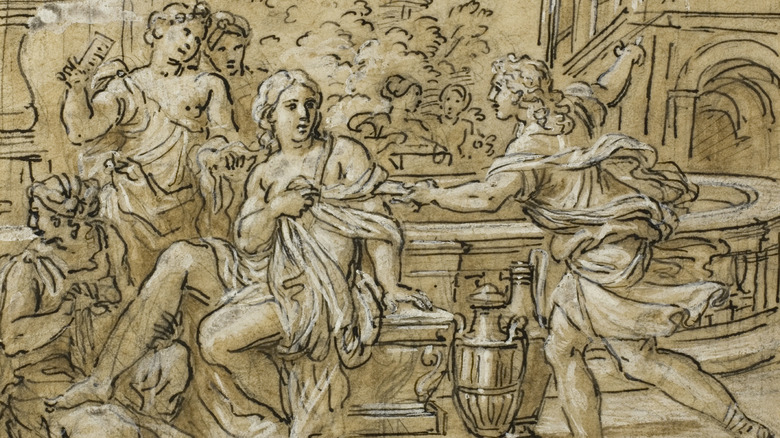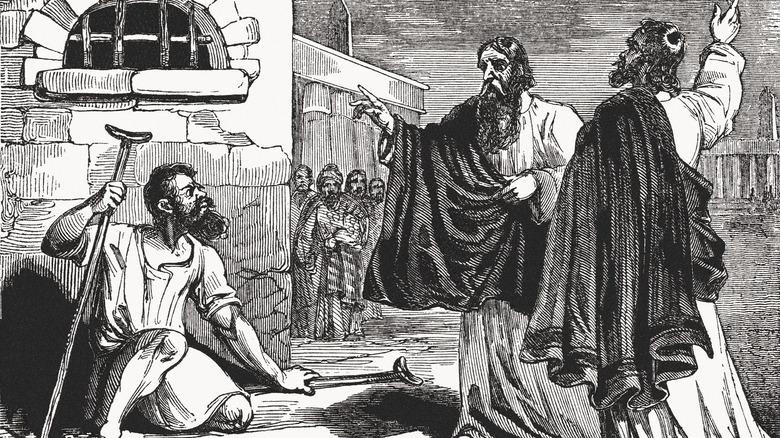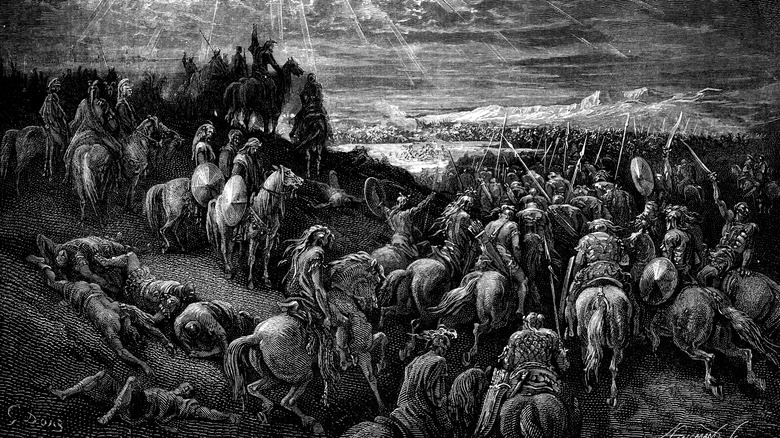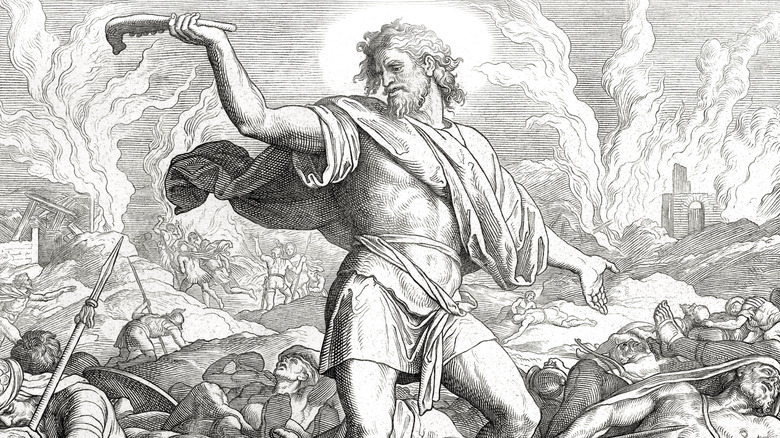Famous Bible Figures You Wouldn't Want To Meet In Real Life
Judging biblical figures by modern standards will always be a questionable game. Even the most upstanding heroes of the distant past committed acts of violence and cruelty that contemporary critics would condemn as unforgivable. It's both a credit to the present day and a critique of those forgotten eras. Pointing out the darker chapters of the Bible is also nothing new. The Good Book contains vivid descriptions of bloodshed and one of the highest death tolls in the history of the written word. The clash of ancient morals and potentially exaggerated tales can create truly horrific characters.
One of the most notable characteristics of the Bible is that God plays favorites. Abrahamic religions tend to have a fascination with redemption, which often reveals itself in the mythos of the imperfect messenger. Because a flawed mortal can deliver the wisdom of a deity, no one is beyond divine intervention. This carries the side effect of sometimes saving horrible people from the same grisly fate that God condemned thousands to a chapter or two earlier. The question of who deserves redemption is left to the wisdom of the Almighty. As a result, biblical heroes and villains often commit acts of evil that would feel at home in "Game of Thrones." Perhaps more than that, many biblical figures would be difficult to be around if you met them in real life.
Abimelech
Kings are rarely the heroes of the Bible. "Abimelech" was once a broad term used to describe Philistine kings, but it also refers specifically to the son of Gideon who became king of Shechem. Abimelech's mother was a concubine, leaving him out of the line of succession. Enraged, he summoned up his mother's family and promised them a chance to seize power. All they would have to do is join him in conspiring to murder his 70 half-brothers. This plan worked well. Not content with the mass murder of his close relatives, Abimelech went on to become a violent despot who abused his power until the day he died.
According to Judges 9, Abimelech's rule faced constant challenge from his unhappy subjects. After weathering one coup attempt, Abimelech wiped out the people of Shechem and salted their fields to guarantee starvation. He killed at least 1,000 civilians in a massive fire. Abimelech then attacked Thebez, but the city's residents walled themselves off in a tower. While Abimelech planned his assault, a woman threw a large millstone down onto his skull, dealing him a mortal wound. Abimelech, terrified of the hit his reputation would take if he died at a woman's hands, asked his young armor bearer to stab him to death.
Herod the Great
Herod I, also known as Herod the Great, was a controversial figure. His sobriquet certainly suggests a positive legacy, but according to historians, the real story of King Herod offers far more brutal tales. In the Book of Matthew, the Bible accuses Herod of the infamous Massacre of the Innocents. Matthew suggests that Herod met with the Three Wise Men on their journey to Bethlehem. He instructed the Magi to report to him after they found the newborn king of the Jews. The Magi reportedly experienced prophetic dreams informing them that Herod intended to kill Jesus, prompting them to ignore their responsibility to return. In his rage, Herod ostensibly ordered the execution of every baby under 2 years old in Bethlehem.
Historians debate the circumstances behind this biblical story, but the general consensus leans away from Matthew's account. In her book "Masada: From Jewish Revolt to Modern Myth," archaeologist Jodi Magness argues for a slightly more poetic interpretation. Citing several other referential elements, Magness writes that Herod's massacre might be more of a callback to the Pharoah's attempt to kill Moses. Moreover, Herod's mass murder of small children might be a reference to his treatment of his own children. Magness cites Augustus casually joking about Herod's tendency to kill his kids. Even if history exonerates him for his nastiest biblical crime, it only does so by convicting him of a potentially greater one.
Jacob
Many ancient religions venerate trickster heroes. It's a common trope to celebrate a protagonist who uses their wits to overcome impossible odds. Jacob belongs somewhere in that conversation, but his status as a hero is questionable. In Genesis 25, Jacob convinced his elder twin brother, Esau, to trade his birthright for a meal when he's hungry. As their father, Isaac, became old and blind, Jacob deceived his father to take advantage of this unfair trade. At the behest of his mother, Jacob donned his brother's clothes and covered himself in fur to trick his elderly dad into giving him Esau's blessing. When Isaac realized he'd blessed the wrong son, he acknowledged the trick and decided he could do nothing about it.
Jacob stole everything from Esau, but his mistreatment of his family did not end there. He had two wives, but he loved one far more than the other. His favoritism was so clear that his children sold his preferred kid, Joseph, into slavery to spite him. Historians debate whether Jacob existed, and there's reason to hope he never did.
Noah
Noah is most famous for the ark story. He's not exactly a noble hero in that tale, but he's certainly no villain. God floods the world, leaving only one decent man and his family to preserve humanity. However, Noah's other stories are a bit more complicated. Noah lived a full life after his watery ordeal. Genesis 9 explains his life as a farmer, eventually presiding over a vineyard. Noah took to grape cultivation and became very fond of wine. This somehow led him to hang around the vineyard nude, with terrible consequences.
Noah's son, Ham, spotted his naked father by mistake. He informed his brothers, who used that helpful knowledge to enter Noah's tent backwards and cover his body. Ham's actions inexplicably enraged Noah, who cursed Ham's son, Canaan, to a life of servitude to his brothers.
Scholars have put forward a lot of theories about this bizarre passage, but there's no single accepted explanation. Despite the text, it's theoretically possible that Noah's son did something far worse than simply witnessing his father's exposed body. The language used could imply that Ham slept with Noah's wife or even Noah himself. This curse for a sin of immodesty or disrespecting one's parents seems extreme, but the punishment of Ham's son, a seemingly unrelated third party, is inexcusable.
Cain
The Bible has clear villains, some of which have become iconic. Cain was the first human born on Earth after God created Adam and Eve in the Garden of Eden. He and his younger brother, Abel, had a falling out after an interaction with God. Cain became a farmer, while Abel tended to a flock of sheep. When it came time to give an offering to God, the Lord was far more gracious toward Abel. There are several explanations as to why God favored Abel's gift. Some Bible scholars believe that the language suggests Abel was more faithful in his choice of sacrifice. Cain became woefully jealous and killed his brother.
Interestingly, Cain's murder of Abel was also the first human death, possibly setting a new precedent. After Cain killed Abel and hid it from the Lord, God ordered Cain to wander the world as a fugitive. Cain's first concern was that someone may kill him, prompting God to grant him a form of imperviousness via a mysterious mark. This makes Cain both petty enough to kill his sibling over his jealousy and completely unstoppable. It's a slightly weird punishment, but it thoroughly establishes Cain as a man to avoid. Adam and Eve's largely forgotten third son might be a more enjoyable companion.
Moses
Moses is a mixed bag. He worked to save the Israelites from the Pharaoh, but his career featured some dark chapters. Most of Moses' chapters in the Bible feature him ordering mass deaths on the supposed guidance of his God. By any modern standard, he would be considered a theocratic warlord. Most of his story, including the tale of what happened to his corpse, comes from the religious text. Several accounts feature him murdering his own people for daring to doubt or distrust the absolute faith he demonstrates. His brutal works would label him a villain in any other context, but his allegiance to the Bible's one true Lord assures him a free pass.
Enlightenment thinker Thomas Paine offered brutal condemnations of Moses in "The Age of Reason." He specifically recounts a select chunk of Numbers 31, in which Moses and the Israelites carry out a violent campaign against the Midianites. Their crime, detailed in Numbers 25, was allowing some of their women to tempt Israelite men. Under God's orders, Moses pushes his army to butcher almost every Midianite. He specifically spares only young girls, evidently valuing their virginity and encouraging his men to keep them for themselves. Paine said it best: "Among the detestable villains that in any period of the world have disgraced the name of man, it is impossible to find a greater than Moses."
Elijah
Elijah was a prophet who performed several notable miracles, some of which serve as proof of God's unwillingness to play fair. Many biblical heroes turn their lives around after they receive a sign from the Almighty, but God isn't willing to extend that courtesy to everyone. In 1 Kings, Elijah challenged prophets of Baal, a rival god, to a contest. Each would choose a bull, build an altar, and wait for their respective deity to burn the sacrifice. After laughing at his rivals, Elijah had a ton of water dumped on his bull and called out to Yahweh for fire. The Lord brought down a blaze so great that it ignited the bull and the water.
The witnesses were so impressed by this feat that they immediately turned to worship God. The former prophets of Baal never got a chance to change their ways, as Elijah immediately had them slaughtered by all of his new converts. God might extend a chance at redemption to some, but daring to pray to anyone who isn't him is evidently a bridge too far. Elijah was quickly proven right in his brutality, as God then ended the famine that plagued the region. Yahweh is a jealous god, and Elijah is his brutal instrument.
Elisha
Elisha became a prophet after his mentor, Elijah, threw his ceremonial cape over his shoulders. He worked alongside Elijah until the elder prophet left the world behind and rode a chariot to heaven. Elisha performed a variety of miracles during his life. Most of them would mark him as a heroic and positive feature, especially by the grim standards of the Bible. He purified drinking water, helped armies through droughts, saved widows from debt, turned poison into food, and even raised the dead a couple of times. He's simply a neutral figure in many stories. Also, he once summoned bears to butcher children for mocking him.
With very little context, 2 Kings 22-24 depicts Elisha encountering a group of local boys. They make fun of Elisha for his baldness, prompting him to call down "the Lord's curse on them." Suddenly, two bears emerge from the nearby forest and immediately kill 42 children. This is one of the most disturbing parts of the Bible, and it's an absurd outlier from the rest of Elisha's life. He performs many miraculous acts of kindness with no self-interest in mind, but the first time someone comments on his lack of hair, he murders them with wild animals. It feels like a castoff line from an old Greek myth or a Grimm's fairy tale. Elisha might be more volatile than he appears.
David
Though David is an ostensibly noble and handsome king of Israel, most monarchs have skeletons in their closet. Most of David's life is orchestrated by the man upstairs. God expresses displeasure in King Saul and picks a young shepherd to replace him. It's a long path to get there, starting with Goliath and ending when Saul's son dies. Once David takes the throne, he reveals the imperfections in God's chosen king. One of the most notable stories of his character in the Bible involves him sending a man to die so that he can steal that soldier's wife.
In 2 Samuel 11, David spotted a woman bathing on the roof, had her brought to him, and slept with her. The Bible isn't especially clear on her consent in the matter. That woman, Bathsheba, was the wife of one of David's soldiers. David immediately began planning to hide his adultery and possible sexual assault. He sent her husband, Uriah the Hittite, home from war, hoping that he'd sleep with his wife and raise David's eventual child as his own. He then uses his power over Uriah to send him to the frontline and keep any potential help away, essentially executing him via the enemy army. David quickly swoops in and marries Bathsheba. Even David knows he's in the wrong here, but his son explains that he's been forgiven for no notable reason.
Paul
Paul the Apostle is one of many biblical characters who undergoes a redemption arc. The idea that no sinner is beyond the healing light of the Lord is one of the central theses of the Bible. This isn't always proven to be true, but Paul is one of the lucky ones. God forgives the many sins of Paul's early life. As is often the case, Paul is only partially to blame here. His story follows a unique path because God chose to give him an opportunity. Paul was one of a chosen few who got undisputed proof of the Lord and the opportunity to turn their lives around.
Paul was born Saul, and his early career involved persecuting Christians. In Galatians 1: 13-14, he characterized his actions as "violently persecuting the church of God" and "trying to destroy it." The details aren't especially clear, but he learned the error of his ways by force. Jesus blinded Saul and his men for three days. When they healed, their mind was changed, and Paul was ready to serve the Lord. Paul shifts from a zealous terrorist attacking Christianity to a zealous evangelist for Christianity.
Joshua
Like many other biblical figures, Joshua is essentially portrayed as a hero for enacting religious violence. Joshua was a warlord, spy, and militia leader under Moses, and most of his best tales came in the book named after him. Joshua led an army against five Amorite kings at the Canaanite city of Gibeon. He asked God for several favors. According to Joshua 10, the Lord stopped the sun in the sky for a full day and offered direct military support for the Israelites. He hurled hail from above, killing more enemy soldiers than Joshua's army. Joshua 10:14 specifies that this is the first and only time God has performed this feat.
Biblical literalism paints Joshua as an all-powerful warrior with the Lord at his beck and call. Richard D. Nelson, a pastor and professor, offers a more nuanced take in his 1997 book, "Joshua: A Commentary." One of his main theses suggests that the story of Joshua serves as a justification for regime change, unification, and a "Divine Warrior" God. It combines literary and religious elements to provide a disparate group of people with one shared backstory. Through this lens, Joshua is a hero to his people, but one who invoked his deity to kill those who came before.
Samson
Everyone knows Samson from Judges 15, in which he uses a donkey's jawbone to kill 1,000 Philistine men. Few people realize that Samson started the feud. The story begins in Judges 14, which covers Samson's wedding to Timnah, a Philistine woman. The wedding shakes up some of the locals, but he manages to bring a ceremony together. For no apparent reason, Samson tries to trick his groomsmen with a riddle they couldn't possibly know the answer to. The prize is enough to bankrupt the groomsmen, so they torment Samson's wife until he tells them the answer. Timnah and her father are furious, prompting her dad to give her away to a groomsman. That's what stokes Samson's rage.
Samson goes on a mad revenge quest, but his bizarre desire to trick his groomsmen started the dispute. He's also the one who escalates the conflict to mass violence. It's ultimately the story of a man with unchecked superpowers attempting to deceive and rob people who've done nothing to him, only to lose his wife when he upsets her family. The fact that he's incredible at exacting vengeance doesn't make it any more morally defensible. Samson battled with the Philistines until his death, carrying on a meaningless cycle of revenge that he started for no good reason.

